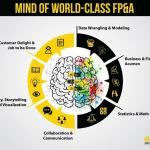This blog focuses on identifying the soft skills needed to complement your technical, planning and analytical...
Strong programming skills (R, SQL, Python, VBA) are coming up frequently as requirements to be successful in financial planning and analysis (FP&A). Those who have not caught up with this yet need to do so. If you are not convinced you only need to do some simple research to find that the FP&A function is becoming a financial BI type of function; we wear many hats – having strong programming skills to provide key insights to decision-makers is one of those hats.
Strong financial modelling ability is needed, period.
What about strong people skills?
“No one knows exactly how much poor communication costs business, industry and government each year, but estimates suggest billions” (Source: "Technical Writing Essentials", BCcampus)
It is paramount that as FP&A professionals, we have the ability to communicate a coherent message and ensure that it is not lost in translation by our recipient.
So, what are some strategies we can use to ensure we are good communicators? These strategies can work for FP&A practitioners or any other professionals looking into ways to improve their communication skills.
Four High-Level Communication Strategies
1. Ask the Question: “Is that clear?”
- An open-ended question that encourages others to also think openly about the problem.
- Asking if something is “clear” makes us dive deeper. This serves as an opportunity to provide clarity if needed.
2. Adapt Different Learning Styles
- Use the learning style of the customer. It can be visual, auditory or kinaesthetic. Humans are usually a mix of all 3 but are drawn more to one. Once you know their preferred learning style combo, use it to communicate.
- For example, if the customer prefers visuals, don’t be afraid to send an email with a process flow diagram. Your goal is to communicate a message, don’t forget about that.
3. Use Non-Expert Terms
- Speak in terms that are clear to the recipients. We all have different levels of understanding.
- There is a really cool explanation of the importance of this – check out the YouTube series called “5 Levels” by WIRED. The main idea is that you shouldn't speak in level 5 terms to someone who has not even been exposed to level 3… Build them up to that point. Otherwise, you will lose them.
4. Get a Regular Feedback
- To ensure the customer receives what they wanted, do not wait for the final deadline. Check in regularly to give the customer a chance to check the progress. There are several benefits of this strategy:
- It gives the customer a chance to revise their original request if the current view is not as expected.
- They are able to provide you with feedback on anything you may have missed.
- Regular check-ins reinforce the intended vision.
These are 4 high-level strategies that I encourage myself to use on a daily basis. They are by no means the only ones and there are sure to be many more. The main goal is to pick the strategies that work for you in the context you need them in.
Another strategy that would deserve an article in itself is contextual learning vs standard learning.
Contextual vs Standard Learning
Standard learning. Imagine someone giving you a list of 30 acronyms that are widely used, but provide no background on their deep meaning. Sure, you will learn those 30 acronyms and be able to list their definitions. But can you apply them? Maybe, and with little applicative understanding.
Contextual learning. There are no lists, no memorisation of terms. Instead, you are encouraged to use the acronyms in the context they are intended to be applied in.
Stephen Krashen termed this style of learning as comprehensible input but in the context of learning new languages. It takes the same approach as to how we learn languages as babies. We don’t learn the mother tongue; we “input” it through comprehensible interactions.
This approach lets the brain do its job by creating neural connections over time that are stronger than just memorising definitions without the context of the application.
I believe that as long as we are all constantly focusing on transcending our current state of emotional intelligence, we will become better communicators both in and outside of the office.
Subscribe to
FP&A Trends Digest

We will regularly update you on the latest trends and developments in FP&A. Take the opportunity to have articles written by finance thought leaders delivered directly to your inbox; watch compelling webinars; connect with like-minded professionals; and become a part of our global community.







